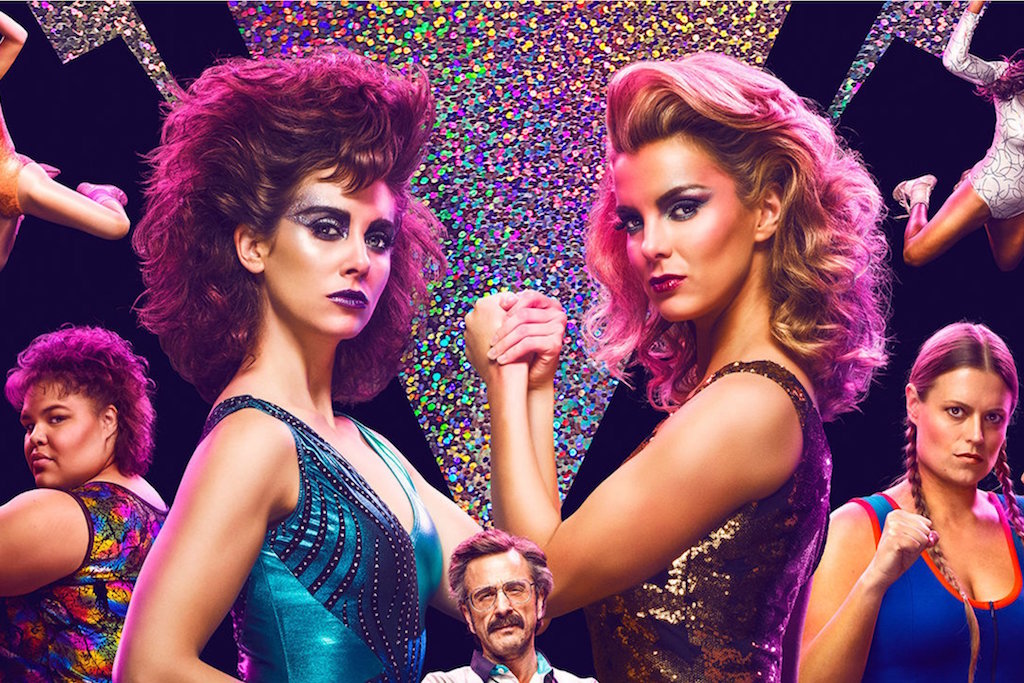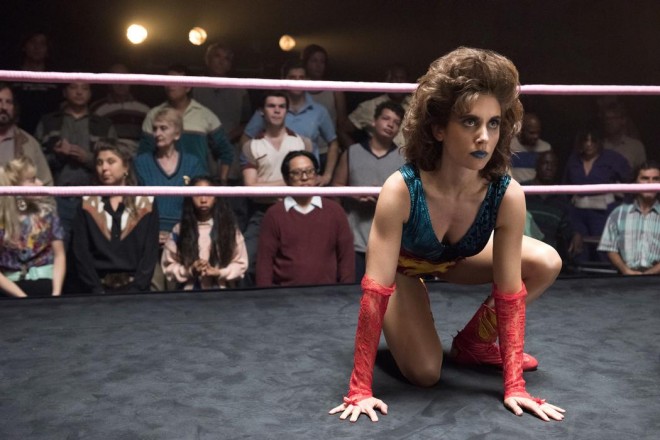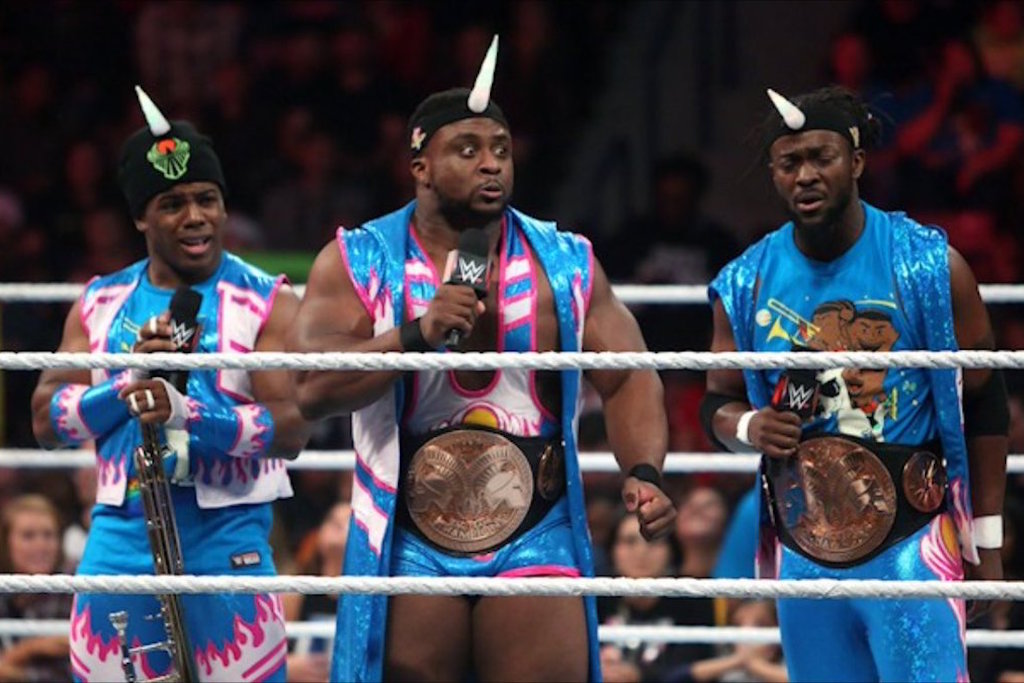Netflix’s ‘GLOW’ Is Scrappy, Empowering And Finally Gets Pro Wrestling Right
A glowing review from a big wrestling fan.

As A Wrestling Fan™, the news of any film or TV show even tangentially related to pro wrestling is always received with trepidation.
It’s so easy to misunderstand wrestling; to paint it as somehow tragic or embarrassing, something that only poor morons enjoy because they somehow don’t understand that it’s “not real”. Using wrestling as a plot tool often becomes shorthand for unspoken classism, not to mention just plain old bad writing.
When it goes well (Darren Aronofsky’s The Wrestler; ‘Uncle Slam vs Osama Bin Rotten’ on The Simpsons), on the other hand, stories set in the world of pro wrestling tap into everything that true wrestling fans hold dear about the world of sports entertainment: the pathos, the campness, the genuine and heartfelt storylines, and of course the chokeslams.
So, when Netflix announced GLOW, a series based on the mid-‘80s all-female wrestling show of the same name, I held my breath. Forget sensitive portrayals of pro wrestling on-screen: how could any series ever hope to capture one of the most deliriously weird wrestling promotions ever to hit screens? Would it be more ‘that dude in your office snorting “you know it’s fake, right”’, or Randy The Ram?
It turns out GLOW creators Liz Flahive and Carly Mensch have done the impossible, magicking up a series that is both a charming and heartfelt dramedy, as well as a show that inherently understands the magic of pro wrestling.
Gorgeous Ladies and Great Characters
A loosely fictionalised account of the creation of Gorgeous Ladies of Wrestling, the series zeroes in on Ruth Wilder (Alison Brie), a hapless actress doing the rounds of disappointing screen tests in Los Angeles. When she gets word of an open call for “unconventional women”, it turns out to be GLOW: a new promotion masterminded by Z-movie schlockmeister Sam Silvia (Marc Maron) under the enthusiastically watchful eye of rich kid producer Sebastian “Bash” Howard (Chris Lowell).
Eventually, 14 women remain. Some of them are enthusiastic amateurs, others aspiring actresses, but only one is a real star: Debbie Eagan (Betty Gilpin), a former soapie actress struggling to adjust to life as a stay-at-home mom. With Ruth and Debbie reeling from a falling out, their backstage drama sets the stage for in-ring conflict.

As the episodes unfold (six were provided for review out of a season of 10), we learn more about the other women — from Melrose (Jackie Tohn) the party girl to Carmen (Britney Young) the daughter of a wrestling superstar. Sam encourages them to embrace sexist and racist archetypes in what he sees (optimistically, perhaps) as a subversive, Z-movie way to “wrestle with stereotypes” in-ring.
To explain much more about the plot is almost beside the point. The first season of GLOW (and hopefully there’ll be more) is effectively a “putting the band together” tale as Sam and the girls try to get their GLOW pilot off the ground.
Viewers familiar with the real GLOW will notice some parallels in the Netflix series’ characters (Carmen/Machu Picchu is clearly this show’s Mt Fiji, the kind-hearted gentle giant of the Gorgeous Ladies; duo Dawn and Stacey could be tag team The Housewives) but GLOW soars without assuming prior knowledge on the part of the viewer.
(The excellent documentary, GLOW: The Story of the Gorgeous Ladies of Wrestling, is also available on Netflix for those who would like a bittersweet insight into the real thing.)
As the caustic, unlikeable Sam, Maron gets many of the show’s best throwaway asides (“According to my ex-wife’s cognitive behavioural therapist…”), but GLOW’s true strength — like any wrestling promotion — is in the sum of its parts.
Each of the characters is fully rounded, even when we only spend moments with them here and there. We only need to see goth weirdo Sheila (the incredible Gayle Rankin) reading blockbuster historical novel Clan Of The Cave Bear to glean everything we need to know about her. UK singer Kate Nash is a scream as Rhonda, the dingbat English babe who decides her gimmick will be Britannica, “the smartest woman in the world […] like the encyclopedia”. Sunita Mani delights as medical student Arthie, whose grandma is the biggest wrestling fan of all.
Brie and Gilpin are exceptional too. Gilpin is a knurled fist of rage and The Feminine Mystique resentment, while Brie tracks Ruth’s journey from average-but-enthusiastic actress obsessed with “sides” and method workshops to someone with the makings of a genuine star. (Brie also takes a snap suplex like an absolute champ; the actresses were trained by six-time WCW/WWE Cruiserweight Champion, Chavo Guerrero Jr.)
The Glow Of Pro Wrestling
Further pointing to Netflix’s usurping of HBO as the king of TV’s golden age, GLOW’s craft is as strong as its cast. The show exists in a lived-in 1985 that, well, glows with the low-lit, wood-panelled interiors of memory.
Director of photography Christian Sprenger (Atlanta) conjures up hazy urban dreamscapes that recall Allen Daviau’s work with Steven Spielberg in the early-’80s. In this way, the show is a great companion piece — albeit tonally poles apart — with Stranger Things.
After a number of disastrously chintzy movies and TV shows set in similar worlds (looking at you, Rock Of Ages), it’s also a delight to find the show is no parade of brand-new Reeboks and scrunchy socks. Costume designer Beth Morgan and production designer Todd Fjelsted have worked miracles on that front, from Bash’s pushed-up trench coat sleeves to Beth’s worn-out leotards, and from Debbie’s suffocating Pasadena home to the moth-eaten Van Nuys motel the ladies are shacked up in during training.
“GLOW represents pro wrestling’s scrappy, carnie spirit and life-altering power.”
The score, by Craig Wedren and Pink Ape, sensitively and playfully recalls the depths and heights of mid-‘80s soundtrack, from swooning teen movie motifs to fist-pumping inspirational cues, while the soundtrack features wittily chosen period-appropriate songs, including a pitch-perfect use of The Scorpions’ ‘Rock You Like A Hurricane’ that repositions it as an empowerment anthem.
It’s also a dream to see so many women behind the camera, with directors including Kate Dennis, Sian Heder, Melanie Mayron, Claire Scanlon, Lynn Shelton and Wendey Stanzler, and episodes written by Flahive and Mensch, Sascha Rothchild, Rachel Shukert and executive producer (and Orange Is The New Black creator) Jenji Kohan.
Most crucially, however, GLOW hums with the multifaceted glories of professional wrestling. In episode five, for instance, Carmen takes Debbie to see “a real wrestling show” in an attempt to shake the soapie queen free of her misconceptions.
Going to my first wrestling event was, simply put, a life-altering experience, so to see Debbie undergo the same transformation brought tears of joy to my eyes. When she has a ringside epiphany, realising that the wrestling storyline playing out before her is the same as the soap opera plots she knows so well, it’s as exciting as any code-breaking moment of blockbuster cinema.
With WWE seemingly determined to undermine its “Women’s Evolution” at every turn, who knew the biggest boost to women in wrestling (and women in TV) would come from a small-screen adaptation of a long-forgotten promotion dismissed by many as a joke? If The Wrestler explored the heartbreak and regret of wrestling, GLOW represents its scrappy, carnie spirit and life-altering power — and should convert plenty of first-timers, just like Debbie.
–
GLOW is on Netflix now.
–
Clem Bastow is an award-winning writer and critic with a focus on popular culture, gender politics, mental health, and weird internet humour. She’s on Twitter at @clembastow.
–
Love film and TV? We’re holding our inaugural Video Junkee festival in July, a new annual event for lovers and creators of online video. Video Junkee is on July 28 & 29 at Carriageworks in Sydney, featuring keynotes, masterclasses, screenings, interviews and more. Tickets are on sale now.
